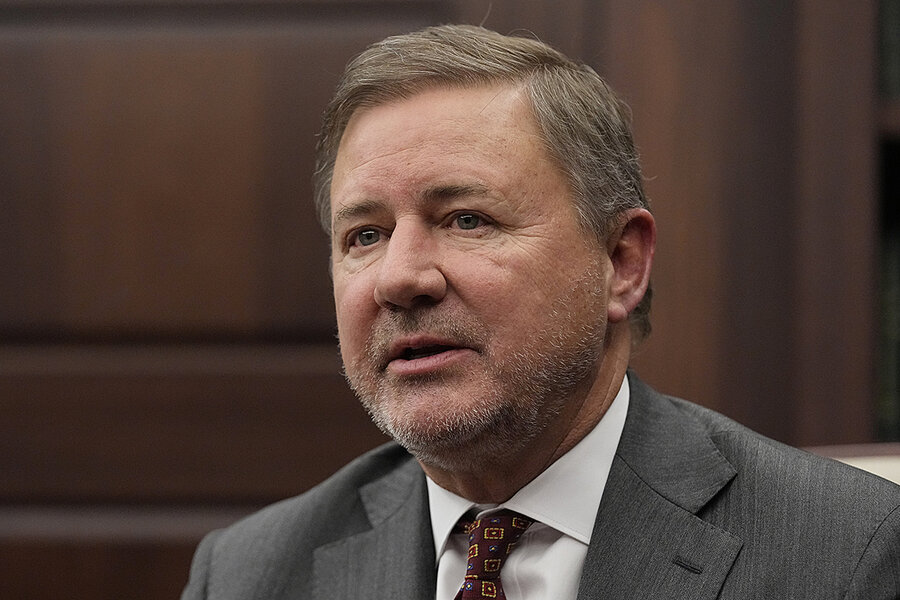Religion and public education: How a new charter school tests the law
Loading...
More than six decades ago, a landmark U.S. Supreme Court opinion deemed prayer in public schools unconstitutional. But that hasn’t stopped other attempts to blur the line between taxpayer funding and religious education.
The latest effort stems from Oklahoma, where a relatively obscure school board recently voted to allow a Catholic charter school. It would be the first religious public school in the nation. And its approval comes amid a backdrop of cultural battles about what can be taught inside classrooms and how public dollars should be equitably distributed for education purposes.
Why We Wrote This
Recent Supreme Court decisions may have opened the door to religious public schools funded by taxpayer dollars. The first such school was announced in Oklahoma in June, raising questions about constitutionality – and the effect on education.
The move sets the stage for litigation and a courtroom showdown revolving around the separation of church and state – and where public schools fit into that time-honored American principle.
In its most recent charter application, the Archdiocese of Oklahoma City argues that prohibiting a religious charter school “violates both Oklahoma’s Religious Freedom Act and the United States Constitution and therefore cannot be enforced.”
Opponents, like Robert Kim of the Education Law Center, are concerned about how the move might encroach on rights.
“This also creates the issue of state-sponsored discrimination against students whose identity or values don’t match those of these institutions or schools funded by the state,” he says.
More than six decades ago, a landmark United States Supreme Court decision deemed prayer in public schools unconstitutional. That hasn’t stopped other attempts to blur the line between taxpayer funding and religious education.
The latest effort stems from Oklahoma, where a relatively obscure school board recently voted to allow a Roman Catholic charter school. It would be the first religious public school in the nation. And its approval comes amid a backdrop of cultural battles about what can be taught inside classrooms and how public dollars should be equitably distributed for education purposes.
The move sets the stage for litigation and a courtroom showdown revolving around the separation of church and state as set out in Everson v. Board of Education in 1947 – and where public schools fit into that time-honored American principle. Here’s a closer look at the school board’s decision and what’s at play moving forward.
Why We Wrote This
Recent Supreme Court decisions may have opened the door to religious public schools funded by taxpayer dollars. The first such school was announced in Oklahoma in June, raising questions about constitutionality – and the effect on education.
What happened?
In January, the Archdiocese of Oklahoma City submitted an application for a proposed charter school called the St. Isidore of Seville Catholic Virtual School. The vision, as stated in the original application, would be to operate “exclusively for educational, charitable, and religious purposes,” including Catholic teachings built into the curriculum.
The decision fell to the Oklahoma Statewide Virtual Charter School Board. The board, which included a newly appointed member, granted approval for the religious charter school with a 3-2 vote in early June.
The virtual school, set to open in the fall of 2024, would serve students across Oklahoma from kindergarten through 12th grade.
Oklahoma’s Republican attorney general is among those calling the school board’s vote unconstitutional. “By dispensing with the first clause of the First Amendment, three members of the Statewide Virtual Charter School Board drove a stake through the heart of traditional American liberties,” wrote Gentner Drummond in Tulsa World.
Why does it matter?
The Oklahoma decision raises large questions about the separation of church and state, a principle that scholars say is baked into the establishment clause of the First Amendment: “Congress shall make no law respecting establishment of religion.”
The existence of one religious public school could open the door for other states or jurisdictions to follow suit, a situation that opponents say could undermine the institution of public schools in America.
Robert Kim, executive director of the Education Law Center, calls it a “destabilizing” decision.
“We think the states have to provide enough resources for schools to function properly, and we oppose all forms of discrimination in public schools,” he says. “The current situation in Oklahoma really threatens to upend support for public education, which is also threatening to democracy.”
It could also fundamentally shift societal perceptions of charter schools, which are a more autonomous form of public schools that receives tax funding but must follow certain accountability measures. The charter school sector has been growing across the nation and, in the 2020-2021 academic year, enrolled 7.5% of all public school students, according to the National Alliance for Public Charter Schools.
“It’s not a sector that people have a really clear grasp of right now,” says Jon Valant, director of the Brown Center on Education Policy at the Brookings Institution in Washington. “Having religious charter schools enter that sector, in my view, would fundamentally reshape people’s understanding of what a charter school is.”
A revamped view of charter schools, he says, could affect who supports, attends, and works in them.
What has the U.S. Supreme Court said in the past?
Over the past 25 years, there has been an effort afoot to allow tuition assistance programs – such as vouchers or Education Savings Accounts – to be used at private religious schools.
For instance, in 2002, the Supreme Court upheld the constitutionality of an Ohio law that permitted Cleveland students to put voucher money toward religious private schools. At the time, the outcome of the case, Zelman v. Simmons-Harris, was considered a landmark decision.
More recently, the nation’s highest court ruled last year – in a case originating in Maine – that any state tuition assistance made available to families should be allowed for use at religious private schools, not just nonsectarian ones. The Supreme Court’s rationale pointed to the free exercise clause of the First Amendment, which protects the right to practice any religion. It followed a similar ruling in 2020 for a case that started in Montana.
Voucher-style aid typically goes to families who can, in turn, choose what school they want their children to attend. The Oklahoma charter decision, though, would for the first time send taxpayer money directly to a public charter school teaching religion.
“Our concern is that in doing so, this also creates the issue of state-sponsored discrimination against students whose identity or values don’t match those of these institutions or schools funded by the state,” says Mr. Kim of the Education Law Center.
What kind of legal challenges may be on the horizon?
Americans United for Separation of Church and State has vowed to “take all possible legal action to fight this decision” in Oklahoma. The organization’s president and CEO, Rachel Laser, says litigation is being prepared, though the exact timing and location of the filing has not been determined.
“Public schools should never be Sunday schools,” she says. “They can educate but not indoctrinate.”
In its revised charter application, the Archdiocese of Oklahoma City argues that prohibiting a religious charter school “violates both Oklahoma’s Religious Freedom Act and the United States Constitution and therefore cannot be enforced.”
Defending their claim that the prohibition is unconstitutional, Catholic officials pointed to the recent U.S. Supreme Court decisions as well as the very identity of charter schools.
“Charter schools in Oklahoma are not ‘state actors’ for this purpose, regardless how they might be labeled,” they wrote in the revised charter application. “Oklahoma charter schools are not operated in any meaningful way by the State but are subject only to broad oversight, with private – including even for profit – organizations given control over their day-to-day operations.”
Jessica Levin, acting litigation director at the Education Law Center, expects the legal challenge to center around Oklahoma’s own state constitution and charter school laws, which require these schools to be secular and open to all students.
“There need not be any slide down a slippery slope because the law is very, very clear that charter schools are public – that they must be secular, that they cannot discriminate,” she says.










